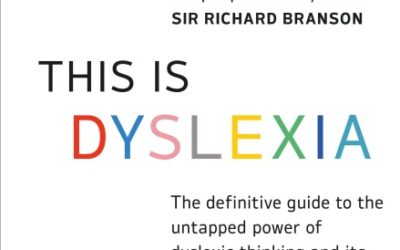Federal Court Orders Clark County School District to Reimburse Parents $456,000. A federal court has ordered a school district to reimburse a family that had accumulated significant expenses to document their student's educational needs with dyslexia, ADHD, and...
Jershika Maple Sings Her Heart Out On “The Voice”
"Jershika dedicated her song to the fourth and fifth grade teachers who helped Maple discover she had dyslexia, and it was filled with emotion and power..." — Taste of Country Jershika Maple described the alienation she felt as a 4th grader in Louisiana being...
Creative Math Educator: Our Story of Dyslexia and Math
Paula Beardell-Krieg is an innovative math educator and paper artist who brings all types of math wonder and discovery in her work as a math educator. As an example, check out her flexagon below. I recently had the chance to talk with her about her experiences...
Made by Dyslexia: Kate Griggs
Social entrepreneur Kate Griggs from the UK has a new book called "This is Dyslexia." Recently, Fernette had the chance to catch up with Kate Griggs, founder of the global charity Made by Dyslexia. It's mission is to "help the world to understand, value and...
Getting a Sense for Numbers [Premium]
For many, math is a somewhat mysterious subject. From an early age, some students may stand out from others in their mathematical ability whereas others don’t and some may seem to have bewildering difficulty with even basic aspects of numbers and math quantity. The last decade has seen significant advances in our understanding of individual learning differences when it comes to math. If you are a teacher, tutor, or parent working with a student with math challenges, understanding the basic extent of the difficulty will help guide you about knowing how to help. POOR NUMBER SENSE Poor number sense is a problem noticed at the very start when children begin working with numbers and quantities. A student may memorize how to count (“1,2,3,4…”), but […]
Writing: How to Start [Premium]
WRITING FOR THOSE WHO HAVE TROUBLE STARTING Dyslexic writers who have difficulty beginning to write often suffer from knowing too much and not too little. There will be challenges of spelling and putting ideas into words, but more often there are larger structural issues like how do I narrow what I know so that I can write what is being asked of me and where do I start with what I want to say? For students who may sit with a blank piece of paper or blinking cursor for hours, having a template for responses, developing a keyword approach like the semantic map in the previous article or mind-mapping big ideas may be a way to get the writing process started. PRE-WRITING TEMPLATES Being […]
Rapid Automatized Naming (RAN) and Its Impact on Dyslexia [Premium]
“Substantial evidence shows that dyslexic readers have problems with rapid naming of visual items. Early research assumed that this was a consequence of phonological processing deficits, but recent findings suggest that non-phonological processes may lie at the root of the association between slow naming speed and poor reading. The hypothesis that rapid naming reflects an independent core deficit in dyslexia is supported by the main findings: (1) some dyslexics are characterized by rapid naming difficulties but intact phonological skills; (2) evidence for an independent association between rapid naming and reading competence in the dyslexic readers, when the effect of phonological skills was controlled; (3) rapid naming and phonological processing measures are not reliably correlated. “ – Araujo et al. 2011 Rapid automatized naming or […]
Dyslexic Mathematicians: Paradoxes and Insights [Premium]
“The life narratives of these research mathematicians describe a non-direct pathway to becoming a research mathematician. They describe barriers that could have limited their process, such as calculus focused on memorization, or classes such as organic chemistry focused on memorization. All participants noted that they moved forward in mathematics once they reached a place in which they were fascinated by the problems, most often, a visual-spatial set of problems to solve.” – Lambert and Harriss, 2020 I recently had the pleasure of talking to Dr. Rachel Lambert at the University of Santa Barbara. Her paper with dyslexic mathematician Dr. Edmund Harriss begins with the following bold abstract: “Using neurodiversity as our theoretical framework, rather than a deficit or medical model, we analyze the narratives […]
George Church: Genomics Pioneer [Premium]
“Your genetics is not your destiny.” – George Church Harvard Professor George Church was shaking things up 3 decades ago when he fathered the human genome project and put himself first in line to have his genome sequenced. The world knows a lot about him, including his dyslexia, narcolepsy, blood type, and even colonoscopy. He argued that the benefits of sharing personal information outweighed privacy concerns. “It’s all too easy to dismiss the future. People confuse what’s impossible today with what’s impossible in the future.” – George Church George Church has done a lot of controversial things in his life and he’s continuing to do them, but what is not in doubt now is that he is at the center of some […]
Congratulations Steven! Season 2 Lego Masters
Congratulations to Steven Erickson and his brother Mark for winning the title of Lego Masters! We previously interviewed Steven in our June 2021 issue where he talked about his dyslexia and how making things always came easy to him although reading and spelling...
Finding Dyslexia: Don’t Delay
"When I first heard that I had dyslexia, I was overwhelmed by emotions; I was angry, sad, and very confused. With time, I began to see my diagnosis as a self-affirmation. I had been correct in suspecting that I had a problem with learning, when many of the adults...
No Small Project: Harvey Fite’s Opus 40
When I heard that what's been called America's Stonehenge, Opus 40, was hand-built by a dyslexic artist, I wasn't really surprised. A lot of dyslexics are grand slam-type creators. Harvey Fite spent half his life creating the Opus 40 Sculpture Park. He hand cut and...





![Getting a Sense for Numbers [Premium]](https://www.dyslexicadvantage.org/wp-content/uploads/2021/12/Sense-for-numbers-e1642618957111-400x250.jpg)
![Writing: How to Start [Premium]](https://www.dyslexicadvantage.org/wp-content/uploads/2021/12/thinking-start-write.png)
![Rapid Automatized Naming (RAN) and Its Impact on Dyslexia [Premium]](https://www.dyslexicadvantage.org/wp-content/uploads/2021/12/Rapid-Automatized-Naming-357x250.png)
![Dyslexic Mathematicians: Paradoxes and Insights [Premium]](https://www.dyslexicadvantage.org/wp-content/uploads/2021/12/Dyslexic-Mathematicians-Paradoxes-and-Insights-5-400x250.png)
![George Church: Genomics Pioneer [Premium]](https://www.dyslexicadvantage.org/wp-content/uploads/2021/12/Genomics-Pioneer-400x250.jpg)
















